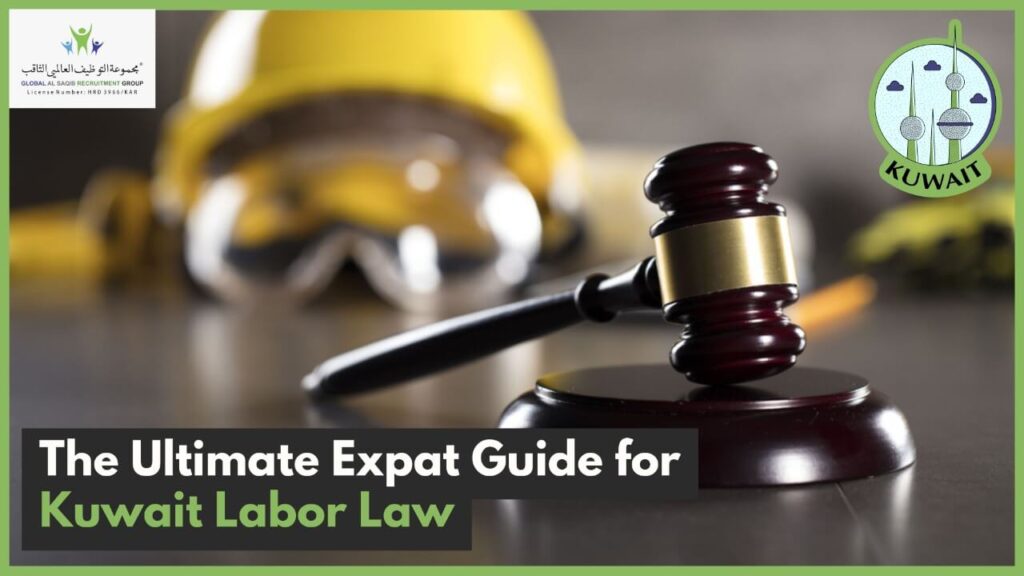Understanding kuwait Labor law is important if you plan to work in Kuwait. Employment conditions of civil servants are regulated by the Labour Law for Government employees. If you will be working in the private sector, you will be governed by the Labour Law of the Private Sector.
People in domestic services in Kuwait, such as chauffeurs and maids, are not governed by any code. They have to rely on general principles of law. The Labour Law of the Private Sector in Kuwait is explained hereunder
Labor Law of the private sector
The Ministry of Social Affairs and Labor (MSA&L) enforces labor regulations within the private sector. The law applies to everyone in the private sector except for
- Domestic servants
- Workers on temporary contractors
- Workers who have been working for less than six months.
Private sector labor law does not apply to employees working who work for companies with a head office outside of Kuwait. The Kuwait law will apply if the company has a branch office in the country. Immigrants who work in Kuwait will be governed by the private sector law of the country where their head office is located.
Signing the Employment Contract

Before accepting a position in a company in Kuwait, it is important to sign a written employment contract. Make sure the contract includes the following points as
- Employee terms of service
- A clear job description
- The compensation for the role (including base salary, bonuses, and other benefits).
Your contract will be written in Arabic. Although a second copy may be provided in another language, the version in Arabic is the only one considered authentic in Kuwait. If you ever face any legal dispute with your employer, the contract in Arabic is the only thing you’ll be needing for court hearings.
Probation period
A probation period is a trial period for newly recruited workers. It can last for a maximum of 100 days and can only be applied once to each employee. In Kuwait, if an employee is under a probation period, they can be fired with no prior notice. The employee will receive financial compensation for hours worked.
Salary & Deductions
Basic pay, bonuses, commissions, tips, and other benefits such as housing allowance are included in the employee’s salary. Payments based on expenses and profit splits are not counted toward compensation. You should be eligible for the bonus pay if it is specified in your contract (or the company’s bylaws).
For example, if you are injured on the job then Remuneration matters, as it is used to calculate your terminal compensation or indemnity. Payment will vary based on the type of payment you receive from your employer. If you are paid according to the number of hours you work, the company will use your last salary payable.
As there is no minimum wage listed in the private sector labor law, you should expect to receive a monthly salary. If you perform piece work, then you may be paid every two weeks.
Lastly, your employer is expected to pay employees salaries and benefits if they file for bankruptcy. He or she is expected to pay you before settling with creditors.
Working Hours
An employee has to work a week for eight-hour a day and 48-hour work per week. You are permitted to have a one-hour break after every five hours of labor. It is to note that the break is not included in the labor hours.
Employees are given a single day off in a week instead of two days without pay. Most people find Friday convenient for off, don’t forget to check your contract for off before signing.
Holidays
Kuwait labor law gives employees eight days of holiday in a year to enjoy. These holidays are paid and they do not have to go to work during these days. The holidays are:
- Hijri New Year’s Day (1 day off)
- Eid Al Fitr (2 days off)
- Ascension Day (1 day off)
- Prophet Mohammed(PBUH) Birthday (1 day off)
- Eid Al Adha (2 days off)
- National Day (1 day)
- After National Day comes the liberation day holiday. It is not an official holiday for businesses.
Sick Leave
An employee in Kuwait can take a sick leave only if he shows a medical record to the employee that proves his sickness. For any serious illness, you are allowed to have 40 total days of sick leave and receive full pay for the first ten. After that, pay is reduced incrementally as follows :
- 75% pay for days 11 – 20,
- 50% pay for days 21 – 30,
- 25% pay for the last 10 days.
- If you use up all 40 days and require more days for recovery, your employer can give you up to 30 additional days of unpaid leave.
Annual Leave
The employees are given 14 days of leave after a year of employment. Once an employee completes five years of his or her employment, the number of leaves jumps to 21 days every year. These days are not included in sick days and holidays, and employers have the power to schedule an employee’s leave.
If you are terminated from your job, you should know that you are entitled to a cash payout equivalent to your accumulated leave.
Overtime

Your employer can make overtime work a requirement, but he or she will have to put in a written request if he wishes to do so. Overtime rates are 1.25 times your salary for regular workdays and 1.5 times if you’re asked to work on your day off. Overtime that is scheduled on holidays earns you double your current salary.
Overtime hours cannot exceed two hours on any workday, six hours during any week, and 180 hours in a year.
Minor Employees
The Kuwait labor law prohibits the employment of children who are under the age of 15.
Female employees
Women should receive the same compensation as men for the same level of work or role.
- They are expected to work the same number of hours in a day.
- Women are not allowed to work a night shift i.e 8 pm to 7 am. But if It female is employed at a hotel, clinic, or pharmacy, then there are exceptions.
- Those women who are employed by public utility offices, banks, restaurants, beauty salons, or offices, in this case, are allowed to work until midnight.
- Employers are expected to arrange safe transportation for any woman working at night.
Maternity Leave
According to Kuwait labor law, Pregnant women are allowed to take a total of 70 days of paid leave, but their delivery date must fall somewhere within 70 days. New mothers are also given an option of taking up to four months of unpaid leave.
Employers are prohibited from firing women during their maternity leave and once a woman is back at work, nursing mothers are provided a two-hour break so they may nurse their babies.
Also, any employer who employs 50 women or 200 men is required to provide on-site daycare for children aged four and under.
Health security
Your employer is responsible to protect all his employees from physical hazards and occupational, or work-related, diseases.
- It is mandatory for them to ensure the workplace is clean and there is proper ventilation in the workplace
- Employers should ensure that first aid kits are easily accessible and readily available to employees in case of any emergency.
- If public transport is inaccessible to work areas, it should be arranged by your employer.
- Access to drinking water and proper food supplies should also be provided to employees working in remote areas.
Workplace Injury
According to Kuwait labor law, Injuries must be reported to both the police and MSAL if they occur at the workplace. If you injured yourself at work, you have the right to receive medical treatment, at your employer’s expense, at any hospital or private medical clinic your employer thinks is appropriate.
The employee is also entitled to compensation for any injuries he obtained due to work. The employee and his family can request compensation from the company if the injuries caused a disability of 25% or greater. The amount of compensation will be dependent upon the extent of your injuries.
Dispute Resolutions
If you get into a dispute with your employer, it is best to try to communicate and make a settlement of the issue between yourselves first. If you are unable to come to an agreement, you may register the dispute resolution with MSAL within 7 days.
MSAL will step in and mediate if the two of you cannot reach a resolution. If, after 15 days, MSAL is unable to reach a resolution between the parties, the issue will be sent to court before the Labour Dispute Arbitration Committee. The decision will be made there that will be final and binding.
Compensation

According to the kuwait Labour Law, employees are entitled to receive full end-of-service compensation at the end of a contract. This amounts to 10 days of pay for the first five years of employment and 15 days of pay for those who were employed for six years or longer.
As an employee, you are entitled to full indemnity if your employer terminates your contract or fails to renew it.
Termination
Both the employer and the employee have the option to terminate the employment contract. A notice should be given to the employee beforehand. An employer can only terminate an employee without notice under the following circumstances:
- If the employee is found responsible for a large company loss
- If the employee got the employment using fraudulent documents
- If the employee revealed company secrets that caused financial damage to the company
- Whoever decides to terminate the contract, the employer or the employee must compensate the other party for money lost during the notification period i.e what they would have earned during the remainder of your contract.

